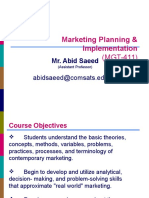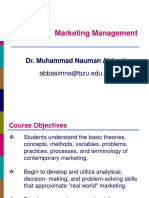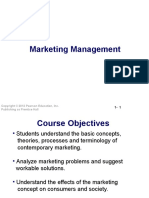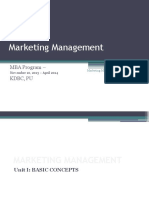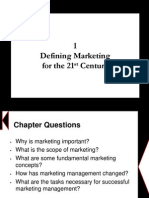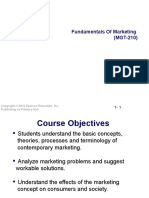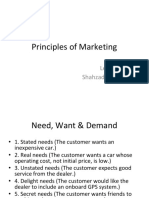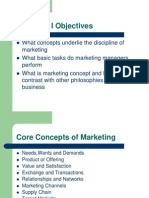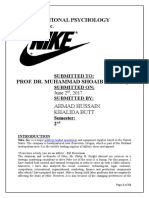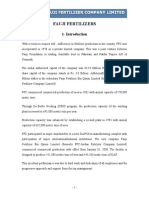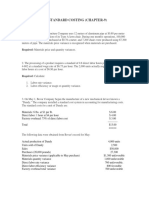Marketing Planning &
Implementation
(MGT-411)
�Course Objectives
Students understand the basic theories,
concepts, methods, variables, problems,
practices, processes, and terminology of
contemporary marketing.
Begin to develop and utilize analytical,
decision- making, and problem-solving skills
that approximate "real world" marketing.
Develop a consciousness about the
importance of ethics in the marketing
discipline.
�Learning Outcomes
Understand the importance in business
practice of being marketing oriented.
Describe a range of common strategies for
use with each of the various marketing mix
tools: product, pricing, promotion, and
distribution.
Recommend and justify an appropriate mix
of such strategies to form a cohesive overall
strategy for a given marketing task or
situation.
�Recommended Books
Marketing Management A South Asian Perspective
by Philip Kotler, Kevin Lane Keller, Abraham Koshy &
Mithileshwar Jha, 13th Edition, Published by Pearson
Education, Inc.
Strategic Marketing Management Meeting The
Global Marketing Challenges by Carol H. Anderson &
Julian W. Vincze Published by Houghton Mifflin Company.
Principles of Advertising & IMC by Tom Duncan 2nd
Edition, Published by McGraw-Hill Irwin.
Principles of Marketing by Philip Kotler & Gary Armstrong
Thirteenth Edition, Published by Prentice Hall
�LECTURE-1
Defining Marketing
for the 21st Century
�Chapter Questions
Why is marketing important?
What is the scope of marketing?
What are some fundamental marketing
concepts?
How has marketing management changed?
What are the tasks necessary for successful
marketing management?
�What is Marketing?
Marketing is an organizational function
and a set of processes for creating,
communicating, and delivering value
to customers and for managing
customer relationships
in ways that benefit the
organization and its stakeholders.
(American Marketing Association Formal Definition)
�What is Marketing?
Marketing is an organizational function
and a set of processes for creating,
communicating, and delivering value
to customers and for managing
customer relationships
in ways that benefit the
organization and its stakeholders.
(American Marketing Association Formal Definition)
�What is Marketing Management?
Marketing management is the
art and science
of choosing target markets
and getting, keeping, and growing
customers through
creating, delivering, and communicating
superior customer value.
�What is Marketed?
Services
Events and experiences
Persons
Goods
Places and properties
Organizations
Information
Ideas
�Demand States
Negative Demand
Consumers dislike the
product e.g. Vaccination, Dental work
Nonexistent Demand
Consumers may be unaware
of the product e.g. Foreign Language
course
Latent Demand
Consumers may share a
strong need that cant be
satisfied with existing product
e.g. Harm less cigarettes, Fuel Efficient cars
Declining Demand
Consumers begins to buy the
product less frequently e.g.
churches, Govt. Schools
Irregular Demand
Consumers purchases vary on a
seasonal, monthly, weekly, daily
or hourly e.g. Museums on week days,
Travelling Peak Off Peak time
Unwholesome Demand
Consumers attracted to
products that have undesirable
social consequences e.g. Cigarettes,
Alcohol, Drugs
Full Demand
Consumers are adequately
buying all products.
Overfull Demand
More consumers would like to
buy than can be satisfied.
�Key Customer Markets
Consumer markets
Business markets
Global markets
Nonprofit/Government markets
�Functions of CMOs
Strengthening the brands.
Measuring marketing effectiveness.
Driving new product development based on
customer needs.
Gathering meaningful customer insights.
Utilizing new marketing technology.
�Core Marketing Concepts
Needs, wants, and
demands
Target markets,
positioning,
segmentation
Offerings and brands
Value and
satisfaction
Customer value Triad
Quality, Service & Price (QSP)
Marketing channels
Communication Channels e.g.
Newspapers, Magazines Radio., Television, Mail,
Telephone, Billboards, Posters, Fliers, CDs, Audio
Tapes & Internet
Distribution Channels e.g. Distributors,
Wholesalers, Retailers, & Agents
Supply chain
Competition
Marketing environment
Task Environment e.g.
Company,
Suppliers, Distributors, Dealers & Target
Customers
Broad Environment e.g. Demographic,
PESTL
Marketing planning
�The New Marketing Realities
Major Societal Forces
Network information technology
Globalization
Deregulation
Privatization
Heightened competition
Industry convergence
Consumer resistance
Retail transformation
Disintermediation
�New Consumer Capabilities
A substantial increase in buying power
A greater variety of available goods and
services.
A great amount of information about
practically anything.
Greater ease in interacting and placing and
receiving orders.
An ability to compare notes on products and
services.
An amplified voice to influence public opinion.
�Company Orientations Toward The
Market Place
The Production Concept
Consumers will prefer products that are widely available &
inexpensive e.g. Lenovo, Haier etc.
The Product Concept
Consumer favor products that offer the most quality,
performance, or innovative features e.g. Rolex etc.
The Selling Concept
Consumers & businesses, if left alone, wont buy enough of
the organizations products e.g. Insurance, Encyclopedias etc.
The Marketing Concept
Emerged in mid 1950s Customer-Centered Sense &
Respond e.g. Dell Computer etc.
�Marketing Mix and the Customer
Four Ps
Product
Product Variety/Quality/ Design/
Features/Brand Name/ Packaging/
Sizes/Services/Warranties/Returns
Price
List Price/Discounts/Allowances/
Payment Period/Credit Terms
Place
Channels/Coverage/Assortments/
Locations/Inventory/Transport
Promotion
Sales Promotion/Advertising/Sales
Force/Public relations/ Direct
Marketing
Four Cs
Customer solution
Customer cost
Convenience
Communication
�The Holistic Marketing Concept
Relationship Marketing
Relationship marketing is a strategy designed to foster
customer loyalty, interaction and long-term engagement.
Integrated Marketing Communication
Integrated marketing communication (IMC) is a process
for planning, executing and monitoring the brand
messages that create customer relationship.
Internal Marketing
Internal marketing is the task of hiring, training, and
motivating able employees who want to serve customers
well.
�The Holistic Marketing Concept
Performance Marketing
Financial Accountability
Social Responsibility
Marketing
Corporate Social Initiatives
Corporate social
marketing
Cause marketing
Corporate philanthropy
Corporate community
involvement
Socially responsible
business practices
�References & Bibliography
Marketing Management A South Asian Perspective
by Philip Kotler, Kevin Lane Keller, Abraham Koshy &
Mithileshwar Jha, 13th Edition, Published by Pearson
Education, Inc.
Strategic Marketing Management Meeting The
Global Marketing Challenges by Carol H. Anderson &
Julian W. Vincze Published by Houghton Mifflin Company.
Principles of Advertising & IMC by Tom Duncan 2nd
Edition, Published by McGraw-Hill Irwin.
Principles of Marketing by Philip Kotler & Gary Armstrong
Thirteenth Edition, Published by Prentice Hall
�"Unless you try to do something beyond what you have
already mastered, you will never grow."
- Ronald E. Osborn
The End
